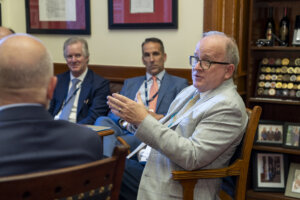By Mike Rosa, Senior Vice President of Economic Development
Texas and Dallas-Fort Worth have enjoyed a record run of economic prosperity and corporate announcements. However, our winning economy isn’t automatic. We have to work strategically to keep our momentum.

A research and development tax credit is a key to unlocking our economic future. Our ability to foster innovation and grow new ideas, solutions, and companies from our own dirt is a critical part of our competitive advantage—and the Texas Legislature has an opportunity to secure that advantage by extending our state’s R&D tax credit.
On Tuesday, March 11, bills were filed in both the House and Senate to offer a franchise tax credit for qualified research expenses that will encourage R&D investment across the state. Texas’ current R&D tax credit is due to expire in 2026. Passing Senate Bill 2206 by Sen. Paul Bettencourt and coauthored by Sen. Joan Huffman and House Bill 4393 by Rep. Charlie Geren is essential.
Understanding Texas’ innovation gap
Texas is the nation’s second-largest economy, but we rank No. 33 in R&D investment. We contribute just 4.3% of U.S. business-funded R&D, while California leads with a commanding 36.2%. These figures represent missed opportunities for groundbreaking advancements, especially in high-growth sectors like life sciences, advanced manufacturing, and technology.
The economic benefits at stake
A new economic impact study by Dr. John Diamond of Rice University’s Baker Institute, commissioned by Texans for Innovation (of which the Dallas Regional Chamber (DRC) is a member), delivers compelling evidence: extending the R&D tax credit would create more than 113,000 jobs and generate $13.8 billion in additional Gross State Product in just the first ten years.
For many industries, the R&D process represents the critical “first phase” where ideas and problems are developed into the products and solutions that power our economy. For our region—which has become increasingly attractive to life sciences companies like Verily, Koya Medical, and Psychemedics relocating from coastal hubs—R&D investment is the foundation of continued growth.

This tax credit helps us seed the future, loosening the soil for companies and their innovations to take root and contribute to our economy.
The path forward
As Dr. Diamond notes, “The question is not whether Texas can afford to extend the R&D tax credit, but instead whether Texas can afford not to.”
Supporting SB 2206 and HB 4393 means strengthening Texas’ hand in the global competition for innovation leadership, ensuring DFW companies can keep building their new ideas right here in our backyard and that other companies choose our state for their most cutting-edge work.
Is the R&D tax credit plan an opportunity for your business? We want to know about it as the DRC’s Public Policy team is down in Austin representing our region’s interests. Send the team a note to join our advocacy efforts.